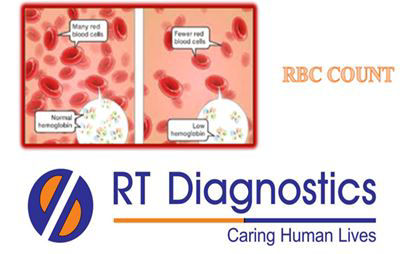# RBC Count
RBC count is also called an erythrocyte count. RBCs contain hemoglobin which carries oxygen throughout the body, hence reduced levels can lead to signs and symptoms of anemia such as fatigue, exhaustion, etc. The result of RBC count can be used to help diagnose blood-related conditions such as iron deficiency anemia (reduced RBC levels are found) and could also indicate B6, B12, or folate deficiency.
RBC COUNT:
Red Blood Cell (RBC) count is known as Erythrocyte Count or Red Cell Count. For monitoring the health conditions the red blood cells RBC count performed. This common health check-up helps to diagnose anemia (Lower Number of RBC) and polycythemia (High number of RBC).
CLINICAL INFORMATION :
This test is usually done for altered levels of RBCs in the body such as in blood cancers, usually during dehydration when the number of red blood cells increases or when the total blood volume is reduced and also during anemia when RBCs level is reduced indicating anemia either due to reduced production of RBCs or destruction of RBCs as seen by many infections and/or infestations of intestinal parasites. This test is suggested in patients with symptoms of tiredness or weakness, shortness of breath, etc., due to anemia or dehydration. Other associated tests include flow cytometers for abnormal cells or/and on a blood smear observed under microscopy.

General instructions:
Sample Requirement: Specimen - Blood sample drawn from the vein. Test Preparation: None.
NOTE - Sample for specimen collections may vary based on the patient’s condition/cases according to the patient’s presenting complaints/signs or symptoms:
SPECIMEN REQUIREMENT (Special or Rare Cases) - As instructed and guided by Physician / Clinician / Pathologist / as per Laboratory’s requirements, according to procedures and protocols.
This Multi-Specialty Clinical Referral Laboratory “RTDIAGNOSTICS” provides precise and accurate tests with an extensive range of testing service to the medical centres to help in the diagnosis and identification of pathology in the test specimens for infectious diseases and also to evaluate the function of organ systems of the patient. It prevents further complications and helps to stabilize and restore health to near normalcy at the earliest without delay.



